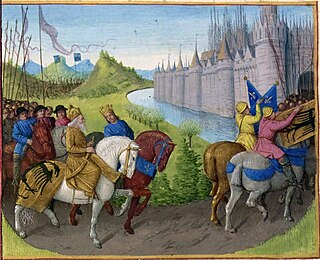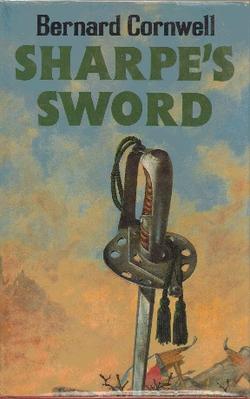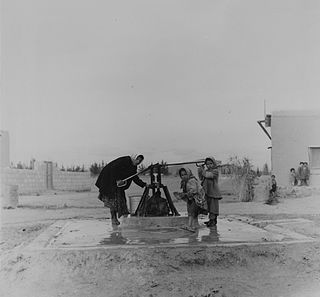
Richard I, known as Richard Cœur de Lion or Richard the Lionheart because of his reputation as a great military leader and warrior, was King of England from 1189 until his death in 1199. He also ruled as Duke of Normandy, Aquitaine, and Gascony; Lord of Cyprus; Count of Poitiers, Anjou, Maine, and Nantes; and was overlord of Brittany at various times during the same period. He was the third of five sons of Henry II of England and Eleanor of Aquitaine and was therefore not expected to become king, but his two elder brothers predeceased their father.

1781 (MDCCLXXXI) was a common year starting on Monday of the Gregorian calendar and a common year starting on Friday of the Julian calendar, the 1781st year of the Common Era (CE) and Anno Domini (AD) designations, the 781st year of the 2nd millennium, the 81st year of the 18th century, and the 2nd year of the 1780s decade. As of the start of 1781, the Gregorian calendar was 11 days ahead of the Julian calendar, which remained in localized use until 1923.

Year 1147 (MCXLVII) was a common year starting on Wednesday of the Julian calendar.

Year 1215 (MCCXV) was a common year starting on Thursday of the Julian calendar.

The First Crusade (1096–1099) was the first of a series of religious wars, or Crusades, initiated, supported and at times directed by the Latin Church in the Middle Ages. The objective was the recovery of the Holy Land from Islamic rule. While Jerusalem had been under Muslim rule for hundreds of years, by the 11th century the Seljuk takeover of the region threatened local Christian populations, pilgrimages from the West, and the Byzantine Empire itself. The earliest initiative for the First Crusade began in 1095 when Byzantine emperor Alexios I Komnenos requested military support from the Council of Piacenza in the empire's conflict with the Seljuk-led Turks. This was followed later in the year by the Council of Clermont, during which Pope Urban II supported the Byzantine request for military assistance and also urged faithful Christians to undertake an armed pilgrimage to Jerusalem.

The Eighth Crusade was the second Crusade launched by Louis IX of France, this one against the Hafsid dynasty in Tunisia in 1270. It is also known as the Crusade of Louis IX Against Tunis or the Second Crusade of Louis. The Crusade did not see any significant fighting as Louis died of dysentery shortly after arriving on the shores of Tunisia. The Treaty of Tunis was negotiated between the Crusaders and the Hafsids. No changes in territory occurred, though there were commercial and some political rights granted to the Christians. The Crusaders withdrew back to Europe soon after.

Lord Edward's Crusade, sometimes called the Ninth Crusade, was a military expedition to the Holy Land under the command of Edward, Duke of Gascony in 1271–1272. In practice an extension of the Eighth Crusade, it was the last of the Crusades to reach the Holy Land before the fall of Acre in 1291 brought an end to the permanent crusader presence there.

The Battle of Ascalon took place on 12 August 1099 shortly after the capture of Jerusalem, and is often considered the last action of the First Crusade. The crusader army led by Godfrey of Bouillon defeated and drove off a Fatimid army.

In World War II, French West Africa was not a scene of major fighting. Only one large-scale action took place there: the Battle of Dakar. The region remained under the control of Vichy France after the fall of France and until the Allied invasion of North Africa. French Gabon, the only colony of French Equatorial Africa not to join Free France after the armistice, fell to invading Free French Forces from the neighbouring colonies after the Battle of Gabon, further isolating West Africa.

The siege of Jerusalem lasted from 20 September to 2 October 1187, when Balian of Ibelin surrendered the city to Saladin. Earlier that summer, Saladin had defeated the kingdom's army and conquered several cities. Balian was charged with organizing a defense. The city was full of refugees but had few soldiers. Despite this fact the defenders managed to repulse several attempts by Saladin's army to take the city by storm. Balian bargained with Saladin to buy safe passage for many, and the city was peacefully surrendered with limited bloodshed. Though Jerusalem fell, it was not the end of the Kingdom of Jerusalem, as the capital shifted first to Tyre and later to Acre after the Third Crusade. Latin Christians responded in 1189 by launching the Third Crusade led by Richard the Lionheart, Philip Augustus, and Frederick Barbarossa separately. In Jerusalem, Saladin restored Muslim holy sites and generally showed tolerance towards Christians; he allowed Orthodox and Eastern Christian pilgrims to visit the holy sites freely—though Frankish pilgrims were required to pay a fee for entry. The control of Christian affairs in the city was handed over to the patriarch of Constantinople.

Sharpe's Prey is the fifth historical novel in the Richard Sharpe series by Bernard Cornwell, first published in 2001. The story is set in 1807 during the Napoleonic Wars.
The Battle of Dakar, also known as Operation Menace, was an unsuccessful attempt in September 1940 by the Allies to capture the strategic port of Dakar in French West Africa. It was hoped that the success of the operation could overthrow the pro-German Vichy French administration in the colony, and be replaced by a pro-Allied Free French one under General Charles de Gaulle.

Sharpe's Sword is a historical novel in the Richard Sharpe series by Bernard Cornwell. It is the fourth in the series, being first published in 1983, though the fifteenth chronologically. Set in the summer of 1812 including the Battle of Salamanca on 22 July 1812, the story follows Sharpe and his friend Sergeant Harper involved in espionage while hunting down the sadistic and highly dangerous Colonel Philippe Leroux.

The Crusades were a series of religious wars initiated, supported, and sometimes directed by the Christian Latin Church in the medieval period. The best known of these military expeditions are those to the Holy Land in the period between 1095 and 1291 that had the objective of reconquering Jerusalem and its surrounding area from Muslim rule after the region had been conquered by the Rashidun Caliphate centuries earlier. Beginning with the First Crusade, which resulted in the conquest of Jerusalem in 1099, dozens of military campaigns were organised, providing a focal point of European history for centuries. Crusading declined rapidly after the 15th century.
Charles Gerald Wood was an English playwright and scriptwriter for radio, television, and film.
Events from the 1220s in England.
Events from the 1190s in England.

Weaver is an alternate history and science fiction novel by British writer Stephen Baxter. It is the fourth and final novel in his Time's Tapestry quartet, which deals with psionic broadcast of history-altering content within trans-temporal lucid dreams.

Ghabaghib is a town in southern Syria, administratively part of the Daraa Governorate, located north of Daraa. Nearby localities include Muthabin to the southeast, al-Sanamayn to the south, Deir al-Bukht, Deir al-Adas to the east, Khan Dannun to the north and al-Qin to the northwest.
David John Pinner is a British actor and novelist. He trained at the Royal Academy of Dramatic Art and has appeared on stage and television in many roles.













